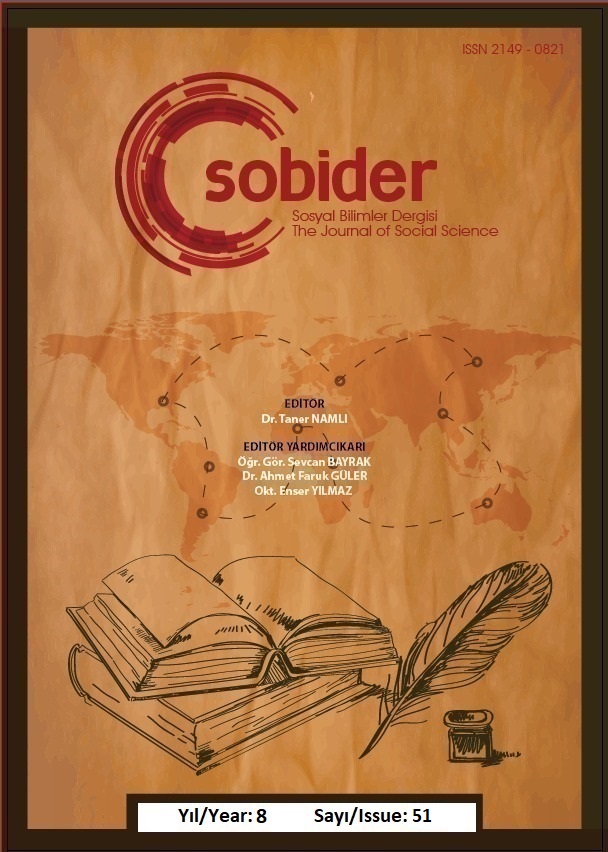Author :
Abstract
İnsan için üç tür mekândan söz edilebilir: Evren, dünya ve kendi kültürel deneyimiyle meyana getirdiği köy, kasaba ve şehir gibi yerleşim yerleri. Hem Tevrat hem de Kur’an-ı Kerim’de Âdem ile Havva kıssasında Allah’ın “şu ağaca yaklaşmayın” emrine muhalif gelmesi neticesinde kendisi için yeryüzündeki serüvenine başlamıştır. Toplumsal bir varlık olan insanının yeryüzünde kendine mekânlar inşa ederek başladığı bu serüveni beraberinde toplu olarak yaşamanın getirdiği sosyal organizasyonları da oluşturarak adına köy, kasaba ve şehir adı verilen toplumsal mekânları oluşturdular. Mekân, insan için üretim ve dağıtımın ve denetim işlemlerinin yapıldığı yerler değildir. Mekân, insanın yaratılışından getirdiği inançla, yüce varlıkla iletişime geçebildiği bir yerin adıdır. Bu yüzden mekân onun için özeldir. İnsanlar, mitolojik dinlerden ilahi dinlere kadar, yüce varlıkla iletişime geçebileceği mekânda onun adına kutsal mekânlar ihdas etmişler ve tarih boyunca bu mekânları görme, dini vecibeleri yerine getirme amaçlı turizm faaliyetleri gerçekleştirmişlerdir. Çalışmada; felsefeden sosyolojiye, coğrafyadan mimarlığa, edebiyattan psikolojiye kadar pek çok disiplinin ilgi alanına giren mekân kavramına farklı açıklamalar getirilmiş, ancak bütün bu açıklamalara burada makale sınırını aşacağı endişesinden kaynaklı olarak bu açıklamalar paranteze alınarak, mekânın kavramsal mahiyeti, kutsallığı değerlendirilmiştir. Ardından mekânın inanç turizmi bağlamında dinlerdeki yeri üzerinde durulmuştur.
Keywords
Abstract
Three types of places can be mentioned for man: the universe, the world and settlements such as villages, towns and cities that he has created with his own cultural experience. He started his adventure on earth as a result of God's opposition to the command of "do not approach this tree" in the story of Adam and Eve in both the Torah and the Qur'an. This adventure that the human being, a social entity, started by building spaces on earth and they created social spaces called villages, towns and cities by creating social organizations that brought living together. Space is not the place where production and distribution and inspection processes are carried out for man. Space is the name of a place where one can communicate with the supreme being with the belief that man brings from his creation. Therefore, the space is special for him. From the mythological religions to the divine religions, they created sacred places on behalf of him where they could communicate with the supreme being. Throughout history, people have carried out tourism activities to see these places and to fulfill religious duties. In this study, different explanations have been brought to the concept of space, which is in the interest of many disciplines from philosophy to sociology, from geography to architecture, from literature to psychology. However, due to the concern that all these explanations will exceed the limit of the article here, these explanations are parentheses and the conceptual nature and holiness of the space are evaluated. Then, the place of religion in the context of religious tourism was emphasized.
Keywords
- Adam, B,(1993). “Dinlerde Hac İbadeti”, Diyanet Dergi, Mayıs, 12-13
- Adam, B,(1993). “Dinlerde Hac İbadeti”, Diyanet Dergi, Mayıs, 12-13
- Altan, İ. (1993). “Mimarlıkta Mekân Kavramı”, Psikoloji Çalışmaları, 19, 75-88Aslanoğlu, A. R, (1998), Kent, Kimlik ve Küreselleşme, Ezgi Kitabevi, Bursa. Bayladı, D, (2007). Tanrıların Öyküsü, İstanbul, Say Yayınları.
- Çağrıcı, M, (2006). “İslam’da Seyahat ve Konukluk ”İnanç Turizmi Günleri III, Doğanay, H, (2001). Turizm Coğrafyası, Çizgi Kitabevi, Konya.
- Eliade, M. (2003). Dinler Tarihine Giriş, Kabalcı, İstanbul.
- Erbaş, A. (2002). İslam Dışı Dinlerde Hac‛, Sakarya Üniversitesi İlahiyat Fakültesi Dergisi C.4, (5): 97-100.
- Gates,C. (2008). Antik Kentler, Koç Üniversitesi Yayınları.
- Güç, A. (2000). Kur’an’da Kutsallık Anlayışı, U.Ü. İlahiyat Fakültesi, S.,9, C.,9
- Harman, Ö, F (1996). “Hac” Maddesi, Türkiye Diyanet Vakfı İslam Ansiklopedisi, 14 / 382- 386, İstanbul.
- Hirschberg, P. (2014). Heilige Stätten, Das wissenschaftliche Bibellexikon im Internet.https://www.bibelwissenschaft.de/stichwort/46879/ adresinden erişilmiştir. (Erişim tarihi: 10.03.2021)
- Kaya, E, (2017). Kentleşme ve Kentlileşme, İşaret Yayınları, İstanbul. Kaya, H, (1996). İnanç Turizmi, Özsan Matbaası, Bursa.
- Kaynak, İ.H, (2016). Dinlerde Kutsal Zaman ve Mekânın Tarihsel Yapısının Fenomonolojik Algısı, S.Ü. Türkiyat Araştırmalar Enstitüsü, (39),443-455.
- Kılıç,S.(2009). “Uzam mı, uzay mı? Peki mekan ne?,Cogito,s.59
- Koçak, A, (2016). Mitlerle Varoluş Yolculuğu, Alfa Basım Yayın, İstanbul.Köse, A. (2016). “Zaman, Mekan ve Kutsal”, Diyanet Dergi, Haziran,30-31.
- Okuyucu, A., Somuncu, M. (2014). “Türkiye’de İnanç Turizmi: Bugünkü Durum, Sorunlar veGelecek”, içinde Bilim, Y., Özer, Ö. (Editörler) İnanç Turizmi Seçme Konular, Çizgi Yayınevi, Konya.
- Oliver, C. (2004). “Städtetourismus in Barcelona und Madrid unter besondererBerücksichtigung der deutschen Reisenden” www.kups.ub.uni-koeln.de/ enge, adresinden erişilmiştir. (Erişim tarihi 10.03.2020)
- Özkaya, A. (2019) Çoklu Mekân Anlayışı: Mekanın Post-Pozitivist Yönüne ve GündelikKavramlara Bilimsel Bir Bakış. https://evrimagaci.org/mekan-nedir-yer-nedir-8031 adresinden erişilmiştir. (Erişim tarihi: 10.03.2021).
- Rutherford, I. (2014). Tapınaklar arasında kutsal bir yolculuk. Aktüel Arkeoloji. s. 74-83.Safran, B, (2015). “Kaos ve Mitoloji, Yunan Mitolojisi ve Felsefenin Doğumu”, www.indigodergisi.com. (04.02.2020).
- Sorensen, V. (1989). Die Geschichte der Unsterblichen, Verlag C.H.Beck, München.
- Süt, A. (2014). İslam ve Turizm İlişkisi, Turkish Studies, International Periodical For The Languagec, Literature and History of Turkısh or Turkic,9/11, Ankara.
- TDK, (1988). Türk Tarih Kurumu, Ankara
- Yeğin, H. İ. (2012). Din Psikolojisi Açısından Kutsal Mekân İnsan İlişkisi, Harran Üniversitesi İlahiyat Fakültesi Dergisi, Yıl: 17, Sayı 27.
- https://mumsema.com.tr/soru/eski-dinlerde-hac-ibadeti/ adresinden erişilmiştir. (Erişim tarihi: 10.03.2021)





